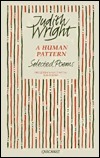What do you think?
Rate this book


242 pages, Hardcover
First published October 1, 1992
There is a poetry of cryptic utterance, and a poetry of direct statement. Judith Wright was a proponent of both. In her early poetry, everything in the world is something else:
Out of the torn earth's mouthThat is a flame-tree, bursting from the ground in a quarry. These waves of 'The Surfer' are similarly otherworldly:
comes the old cry of praise.
Still is the song made flesh
though the singer dies—
For on the sand the grey-wolf sea lies snarling;These a cryptic utterances. They say much, but not directly. In her earlier poems, Wright did not preach or protest. She observed and felt and imagined the forms of her thought in the things around her. Reality was a great riddle. She could always see its riddling qualities.
cold twilight wind splits the waves' hair and shows
the bones they worry in their wolf-teeth.
It was not to remain so. Reading through her selected poems, we witness the transformation of a formidable mind. She is like Thomas Mann in this regard. Her younger self was comparatively apolitical. But like Mann, a life of witnessing led her to become committed. She found that hermitude was impossible. The wrong world, the cruel world, the world of cunning and power, found its way into her rural retreat. Her later poems address this world directly:
You were one of the dark childrenThe poems in A Human Pattern slowly soak up a sense of tragedy, and by the end of the book it is a bleak vision Wright has of her country, Australia:
I wasn't allowed to play with—
riverbank campers, the wrong colour
(I couldn't turn you white.)
I praise the scoring drought, the flying dust,
the drying creek, the furious animal,
that they oppose us still;
that we are ruined by the thing we kill.
These are the twin pillars of her art: her strong sense of religion (for want of a better word) and her passionate positions about Aboriginal people, social justice and the environment. There is something of Percy Shelley in her poetry. She has a similar sweetness of tone in many of her mystical poems, and a similar snarling brilliance in her political ones.
What makes her a truly unique and great poet, however, are other qualities which are harder to pin down. A Human Pattern culminates in two short sequences, 'Notes at Edge' and 'The Shadow of Fire: Ghazals', which particularly display the deep strengths of her poetry.
I stoke the fire with woodThere is a poise to lines like these. Wright constantly compares poets to prophets, and when she mentions other poets, they tend to be particularly enthusiastic and profuse ones, like Keats, Blake, Harpur, Traherne and Brennan. But when she describes her own experiences, she does so with admirable detachment. She can describe her sense of connection to all living things without mentioning herself at all, by finding a precise and unexpected image—in this case, the ramifying mycelia of invisible fungi. Some lines from another poem on the same theme, 'Connections', reveals other aspects of her technique:
laced with mycelia, tread
a crust of moss and lichen.
Over the wet decay
of log and fallen branch
there spreads an embroidery, ancient
source of the forests.
What I find remarkable in these lines is the flow of the ideas. Each couplet could be a standalone poem, and she makes huge leaps between times, places, and topics each time she moves from one couplet to the next. Yet her meaning is clear and easy. It is remarkable how she can turn the most abstruse philosophical disquisitions into the most demotic verse.
The tiny clusters of whitebeard heath are in flower:
their scent has drawn to them moths from how far away?
When I look up at the stars I don't try counting,
but I know that the lights I see can pass right through me.
What mind could weave such a complicated web?
Systems analysis might make angels giggle.
A child, I buried the key of a sardine-tin.
Resurrected, I thought, it might unlock the universe.
Picking up shells on the beach, said Isaac Newton.
Catch a modern physicist using such a comparison.
Those were her very last poems, of course, the fruit of a lifetime's writing, travel and reflection. The fruit of a lifetime's learning, too. I have read few poets whose views of life and poetry change so radically over the years.
You ask me to read those poems I wrote in my thirties?It is a terribly sad thing to read her poems. She was part of the generation when Australian writers truly came of age, when Aboriginal writers joined the literary world, when the best writers finally escaped the colonial mindset, when Australia won its imaginative independence. Her verse thrums with a passionate sense of inheritance, history, and responsibility. This coming of age was also a loss of innocence, however. It is no surprise that Eve is one of the most common figures in Wright's verse. Eve was an exploiter of the land, a sinner, an ignorant youngling thrust into a new country. So Wright felt her own people were, though there was always the chance that the beautiful and open parts of the human spirit would eventually triumph.
They dropped off several incarnations back.